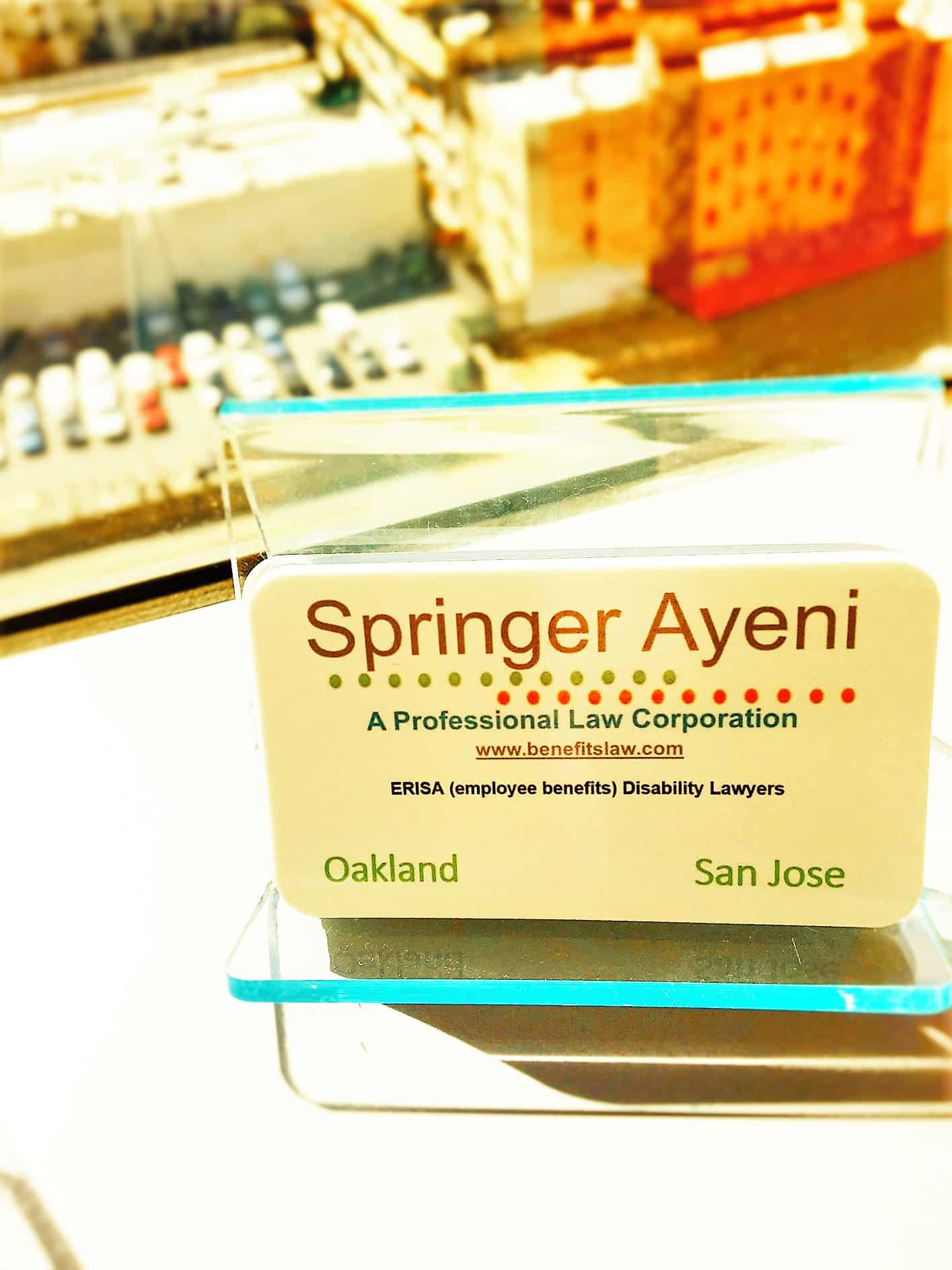Presenting at the American Bar Association (ABA)
I will be speaking on two Employee Benefits Claims panels at the American Bar Association Joint Committee on Employee Benefits sponsored – ERISA Basics National Institute Conference, Chicago, Illinois on October 10th- 12th. I am looking forward to the discussions, questions, and sharing insights into “Administrative Procedures” and “Litigation Overview.”
Read MoreMBC Unity Award
I am honored to be announced as an attorney-recipient of a Unity Award at the 41st Minority Bar Coalition Unity Awards that will be held November 13th @UC Hastings College of The Law. I am deeply thankful to my esteemed colleagues at the Alameda-Contra Costa Trial Lawyers’ Association for nominating me for this award.
For more: https://www.uchastings.edu/event/minority-bar-coalition-unity-awards/
Read More10 Questions to Ask a Disability Lawyer Before You Sign

Let’s face it: it’s daunting to hire an attorney. There are thousands of lawyer jokes for a good reason. But sometimes in life you need a good advocate in a legal proceeding, or just someone to give advice before the going gets rough. Hiring an attorney requires careful consideration of not just the finances of the relationship, but also a determination of whether she will be a good fit for one of the most significant professional relationships you will likely have. These questions will help you avoid making mistakes when choosing an attorney who suits your style.
Q1. Can you give me a cost estimate?
Attorneys will not be offended by this question. We know it’s pricey to hire a lawyer and you need to plan for it. A good attorney will offer a variety of options to work with your budget and risk tolerance. If an attorney offers to work on a “contingency fee,” that means she will work unpaid until securing money on your behalf, and then her fee will be a percentage of that award. Typical attorney contingency fees range from 33-40%. If an attorney offers an hourly rate, be sure to ask if other attorneys in the office can do some of the work at a lower rate, and if administrative tasks can be handled by paralegals or legal secretaries, as this might be a way to reduce the monthly bill. Also ask if the attorney bills in .1 hour or .25 hour increments and if she bills for small emails or voicemail exchanges. Some attorneys may offer a “flat fee,” or you could suggest that option yourself. Many clients like the certainty of a financial cap: but beware the unethical attorney who would accept that amount of money then work as little as possible. You need to trust the attorney you hire before agreeing to any of these arrangements, but especially the flat fee. If you get a “shark vibe,” look in another direction. Also, if you have a creative idea, feel free to propose it! At the very least, it will give you an idea of how open-minded your future attorney might be.
Q2. Can you tell me how you would approach my case?
Most attorneys tread very carefully about giving legal advice without a retainer agreement in place, as they do not want to create an attorney-client relationship where there really is not one. A good attorney will listen to your problems, describe how she might handle your case, and may give some general information or direct you to a resource, but steer clear of an attorney who is over-eager to breach ethical constraints by doling out free advice just to nab you as a client.
Q3. How do you handle these types of cases?
An experienced attorney should have an easy answer to this question. For example, as an ERISA attorney, I am clear about what needs to happen to maximize the chance of a successful outcome when, for example, appealing a denied disability benefit claim. If it was my first rodeo, I wouldn’t have a firm plan of action. Look for a thorough and confident answer to this question.
Q4. Have you ever handled a case with facts similar to mine?
In my area of the law, I interact with people who have myriad ailments causing their disabilities. My clients feel comfortable off the bat if they know I am at least familiar with their medical conditions, and you probably will too.
Q5. How accessible are you?
Some attorneys specialize in reeling in clients and then disappearing. Make sure your attorney will be involved in your case from start to finish, even if she doles out assignments to others in her law firm. Just like most professions, attorney skills and personalities vary widely, so make sure that you are getting what you’ve paid for. Which leads me to…Question 6:
Q6. What are your past results in cases at the same stage as mine?
No attorney could possibly guarantee an outcome in your case – there are too many variables. But an attorney should definitely be able to describe similar cases she has handled and what the outcome has been.
Q7. Will attorneys or paralegals do most of the work in my case?
A law firm that has a paralegal doing attorney work (writing substantive letters, making strategy decisions on cases, etc.), is very different from a law firm where the attorneys do all of the attorney work. Be sure you know who will be working on your case and their credentials.
Q8. What are you most proud of in your career? In your personal life?
Get a sense for the attorney’s values by asking her to describe a case that has meant something to her. You’ll understand a lot about her style and substance by hearing her describe a proud moment. If she’s willing to discuss a proud personal moment, that could be a great opportunity for you to see who she really is. I figure that clients have to entrust a lot of sensitive information to me about their lives, so I definitely don’t mind sharing now and again about my own if asked. It’s the least I can do to bond with my client on a human level.
Q9. At what stage do you get a positive outcome for most of your clients?
Some attorneys like to get to court as quickly as possible. Some attorneys like to try to secure a victory at an earlier stage for their clients. If you are a “rush to court” person, you should find an attorney with a similar mindset. If you prefer an attorney who tries to get a positive outcome sooner, even without having to file a lawsuit, you should hire an attorney who shares a similar point of view.
Q10. How involved do I have to be?
My style is to include the client if she wants, but my preference is to just let her sit back, relax, and let me handle the nitty gritty details of her case without stressing her. Some attorneys may want more client involvement, particularly if they can get a client to do some of the legwork. Figure out how much involvement is comfortable for you, and make sure your potential attorney is a good match for your comfort-level.
Above all, make sure that you like your potential attorney. You will talk with her for hours, email frequently, and she will know more about you than many others in your life might. If you like her, feel like she understands you as a human being, and that she will work tirelessly for you, then it’s a match. And, of course, if you want to talk to me about a disability benefit application, appeal, or lawsuit, feel free to call and ask me any of these questions!
Read More
How to Apply for Long-Term Disability When You Stop Work
By Cassie Springer Ayeni
You never thought it would happen.
You thought you would work until retirement or beyond, but then along came your vestibular disorder. Now, focusing on a computer screen is a challenge; someone has to drive you to work; walking is a safety hazard; and your concentration is not what it used to be. All of these symptoms can interfere with your ability to do the material duties of your occupation, and can make an attempt to get through a workday exhausting and frustrating as you struggle to complete tasks that used to be easy for you. You
see your doctor and she tells you the time has come to stop working due to your disability. Now what? How will you live without your income? Here are some options and a plan:THERE ARE SEVERAL SOURCES FOR DISABILITY BENEFITS Besides savings (and it is almost unheard of for someone in the prime of her
working life to have sufficient savings to live decently for the rest of her days), income sources for people with disabilities include:
1.Short-term disability insurance benefits through your employer (these usually last for 6 months).
2.Long-term disability insurance benefits through your employer (these usually start after 6 months and can last until retirement age).
3.Private disability insurance plans (insurance you purchased for yourself that can last through retirement age or beyond).
4.State disability insurance (usually lasts for a year, such as through California’s Employee DevelopmentDepartment “EDD”).
5.Social Security Disability benefits (SSDI) (available after being disabled for 6 months and lasting through retirement age).
6.Workers’ Compensation benefits (if your disability is due to a work-related injury).
In this article we will focus on the first two of these income sources: short- and long-term disability benefit plans offered by your employer. (See VEDA’s other articles on how to apply for SSDI.)Many employers offer group disabilityplans to their employees because the premiums are low and they can be a huge benefit to employees struck with a disability, whether short- or long-term. These benefits are usually paid by insurance companies such as Unum MetLife, Hartford, Principal, Standard, Cigna/Lina, Guardian, Sun Life, and others.A complex area of law called ERISA (the Employee Retirement Income Security Act) governs these employee benefit plans, even though you apply to an insurance company for payment of the benefits. Under ERISA, there are technical rules governing timelines for the insurance company to decide whether to pay your claim. It is a good idea for you to get help with your disability application and, of course, with an appeal of any denials.
Important Tip: Even though you have a disability plan through your employer, you can still apply for all of the other disability benefits listed
above. However, the benefits are usually coordinated so that you only receive a fixed percentage of your salary altogether, usually 2/3 of yourprevious income up to a maximum benefit per month.
YOUR DOCTOR’S ROLE
Many people with vestibular disorders have a long-standing relationship with a supportive doctor. This relationship is instrumental to getting your disability benefit claims approved. Please make sure that your doctor knows how important it is that she fills out forms promptly so that your income stream can continue while you are not working. Here are some key tips for the “Attending Physician Statements” that you submit to the insurance company.
Tip #1:
Your doctor should answer the question “why is the patient disabled now?” especially if you have been struggling to work while symptomatic fora while. Did it worsen? Have your attempts to keep working caused a decrease in your performance? Is the fatigue from managing your symptoms getting the best of you, causing you to nap during the day? Are the symptoms interfering with your ability to perform the activities of daily living, such as preparing meals? Ask your doctor to be specific and make sure this is in your medical record.
Tip # 2:
One of the areas of misunderstanding with “invisible disabilities” like vestibular disorders is that a successful claim must depend on your report of “subjective” symptoms in addition to any objective tests. For the subjective symptoms to be deemed reliable by an insurance company, your
doctor should point out that you are credible in your symptom reporting. When your doctor notes this, it helps prevent the insurance company from doubting your credibility, an unfortunately common reality when insurance companies are looking for a way to cut costs. A good way to keep track of these symptoms is by keeping a log to share with your doctor: when you are nauseous or have a headache or a bout with vertigo, write it down in a log with a symbol for each symptom, then bring the log to every medical appointment.
Tip # 3:
If you have symptoms that can be objectively documented by testing, please get those tests done as soon as possible. For example, if you have concentration or other cognitive difficulties, ask for a referral for a neuropsychological examination, which provides objective evidence of those
symptoms.
Tip # 4:
Regularly schedule check-ups. Even if you have been relatively stable, it is a good idea to see your doctor at least every 6-12 months. This helps demonstrate to the insurance company that you are under the regular care of an attending physician. Insurance companies typically request medical records every 6-12 months.
Tip # 5:
If you don’t already have an ERISA lawyer, you might want to check in with one now. Your lawyer can work with your doctor to get the forms filled out the right way the first time.SUBMITTING THE APPLICATION Finally, your doctor has told you that resting without working is in the best interest of your health. You have agreed and have decided to apply for benefits.
Here is a checklist:
1.Request the short – and long-term disability application forms from your Human Resources (HR) department.
2.Request a copy of the short- and long-term disability policies from HR.
3.Take a stab at filling out the application forms, but do not feel limited to the boxes on the forms. If you need extra space, include an addendum. If the question on the form doesn’t really apply to you, modify the question and answer tostate what needs to be said about why you are disabled.
4.Make sure that your employer knows they will have to fill out a form verifying your income and job duties.
5.If it’s too overwhelming, ask an ERISA attorney to check your work to make sure that your application gives you the best shot at success.
6.If your application is denied, you should never attempt to appel on your own without the benefit of some legal advice.

